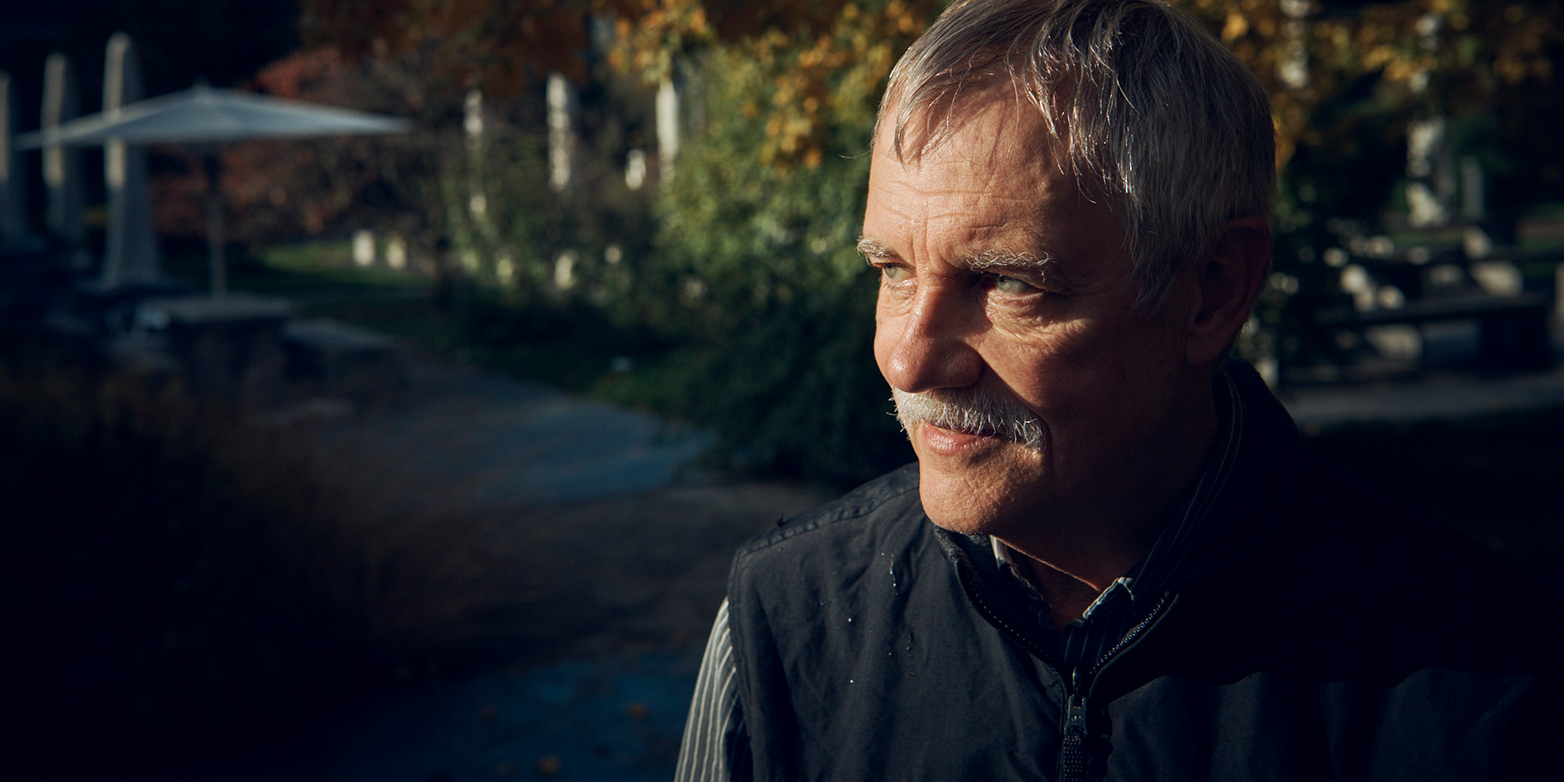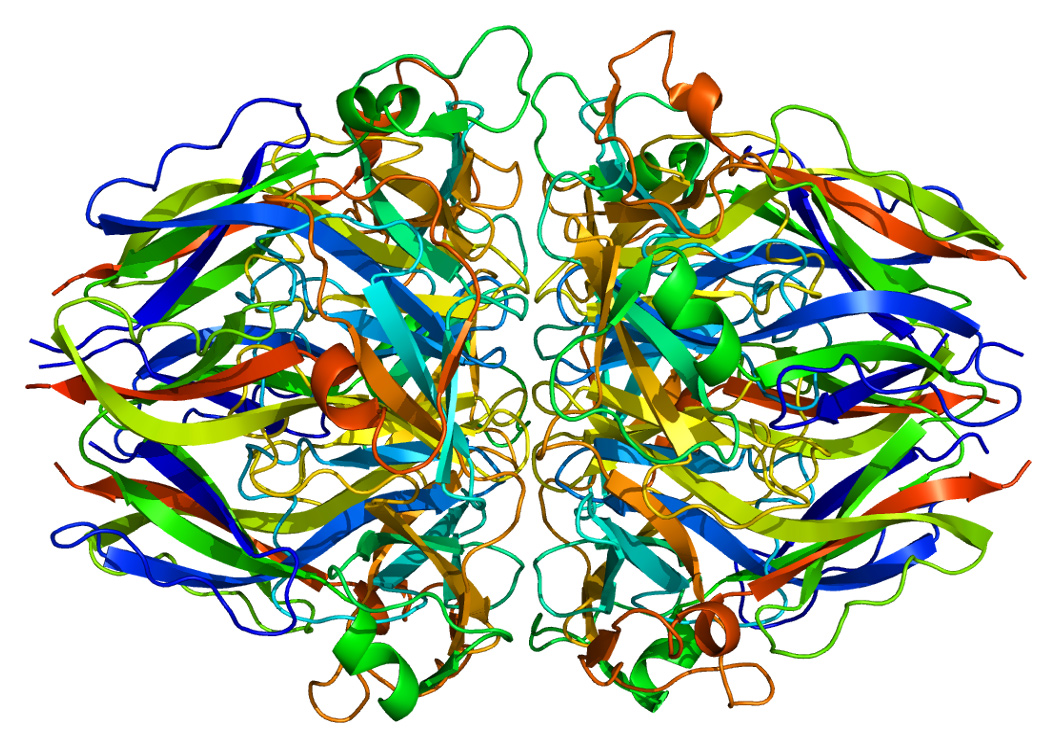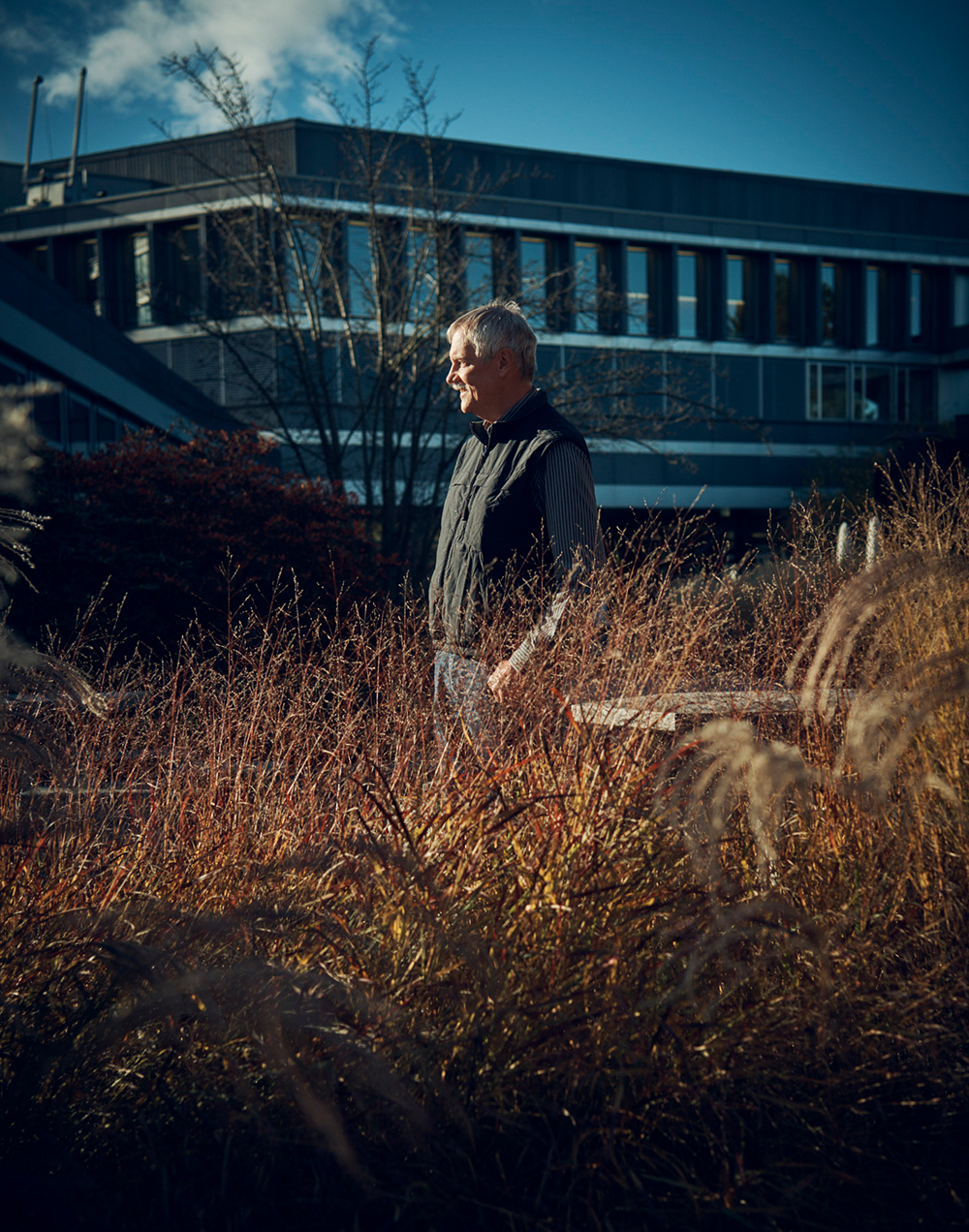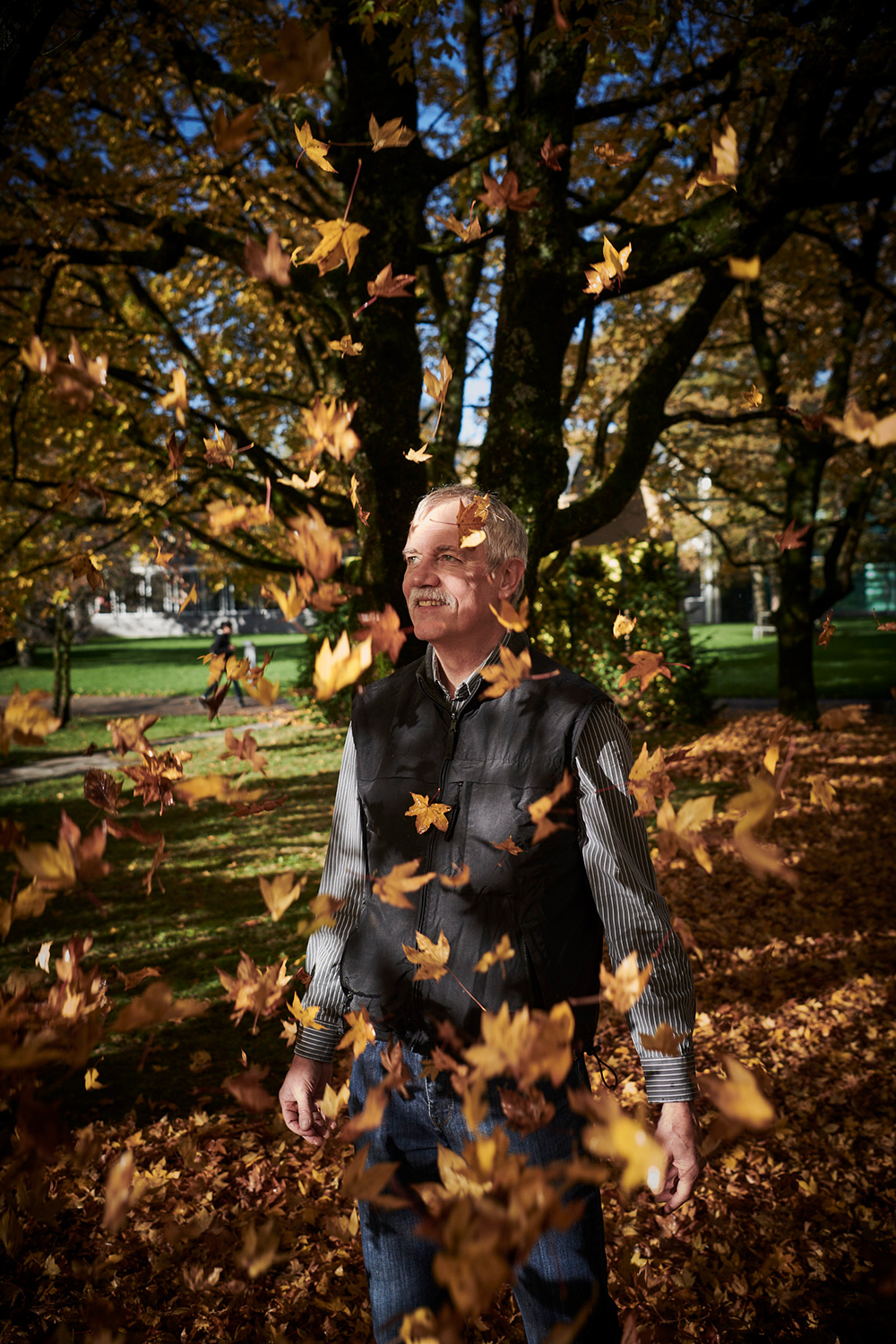A life devoted to protein research
Proteomics pioneer Ruedi Aebersold is retiring soon. Protein analysis was his life’s work, and he paved the way for countless protein researchers around the world.

“The time has simply flown by,” says Ruedi Aebersold, sitting behind the desk in his office. It’s hard to say if the tone of his voice is one of wistfulness, or simply amazement that his retirement is right around the corner, in January 2020. He will hold his farewell lecture on 9 December.
His retirement marks the end of an era for the influential biochemist: he is highly regarded in his field, his publications have been cited tens of thousands of times, and he has earned numerous awards and honours throughout his career. Several of these grace the walls of his office, in addition to two large-scale abstract artworks. “The one picture represents a family of five, much like my own, and I like the other one for its intense colour,” Aebersold explains. He adds, modestly, “I’m not particularly well-versed when it comes to art, and I can’t draw or paint well.”
Instead, his talent lies in science, specifically in the study of proteomics. This specialist field of biology looks at the totality of all proteins in an organism. Aebersold is a pioneer in this area and has set many milestones. He also played no small part in inspiring the many researchers around the world today who investigate the proteome of cells or even of entire organisms.
Years of fascination with proteins
“I became interested in proteins as a student,” Aebersold says. He studied cellular biology at the University of Basel’s Biozentrum, wrote his thesis on the activity of immune factors and delved further into this topic for his doctoral thesis. Working with proteins fostered his fascination for them. “My whole career has been about proteins. They turned out to be a stroke of luck for me.”
“My whole career has been about proteins. They turned out to be a stroke of luck for me.”Ruedi Aebersold
Most proteins are complex molecules. In the late 1970s, working with them was complicated and expensive. “We were able to work with only a very few proteins, as analysing them required huge quantities of each one in a highly pure form,” the ETH professor explains. Back then, working with DNA would have been more attractive, because it was possible to make more progress faster than working with proteins. But his doctoral advisor, biochemist Dietmar Braun from Ciba-Geigy, continued to pursue protein research and built up a group devoted to the topic at the pharmaceutical company.
“Ciba-Geigy had a strong protein chemical group that I was able to join even while I was still working on my master’s degree,” Aebersold recalls. The company had laboratory facilities that the Biozentrum didn’t. “There I was able to acquire skills in this niche that turned out to be very useful later on,” Aebersold says.
As a doctoral student, he had a book that contained all the known sequences of amino acids in proteins. It was a slim volume. Aebersold still has it today: “This book motivated me to refine techniques that we could use to determine amino acid sequences in proteins more easily than before.”
Diving into creative chaos
The laboratory that allowed him to do this was Lee Hood’s lab at Caltech in the United States. It was in the vanguard of laboratory automation and the development of analysis equipment. Aebersold remembers the special atmosphere Hood created: “It was creative chaos.” During his time in the lab, Aebersold collaborated with chemists and engineers to construct his first protein sequencing machine, which could automatically carry out the Edman degradation, a complicated chemical process.
After finishing his postdoc assignment, Ruedi Aebersold moved his wife and their three children to the University of British Columbia in Vancouver, where he was able to set up his first group as an assistant professor in the 1980s.
Mass spectrometry was undergoing a rapid transformation at this time. Another researcher, John Fenn, had just invented electrospray ionisation. This made it possible for the first time to ionise large, fragile molecules like proteins – in other words, giving them an electrical charge and transferring them into the vacuum system of a mass spectrometer. This meant scientists could determine the mass of these molecules and even their amino acid sequence in the mass spectrometer.
Aebersold procured a spectrometer and used it to analyse proteins, thus laying the foundation for his further work. “By coincidence, my education in protein biochemistry had put me in the perfect position to generate biologically relevant data and not just chemical/analytical data,” he says.

Productive period in Seattle
It was again Lee Hood who gave Aebersold’s career another boost. Hood had moved from California to Seattle in 1992 and was setting up a new department at the University of Washington. Hood needed professors for the department and tapped Aebersold for a position. He accepted, and he and his family moved from Vancouver to Seattle.
Today, Aebersold describes his time at the University of Washington as very productive. Milestones included the creation of two centres for genomics and the first ever centre for proteomics. An atmosphere of optimism pervaded the campus. However, the researchers didn’t make the desired progress, and the main reason for that was the structure of the department: “We were unable to expand our groups further due to a lack of space. The field of proteomics was downright exploding, and we didn’t have enough room for our groups to grow and the Department couldn’t recruit additional professors,” Aebersold recalls.
Co-founding a private institute
To escape the dead end of going down the university path, in 2000 Aebersold joined with Hood and immunologist Alan Aderem in resigning their university positions to found a private institute for systems biology in Seattle. “We had lifetime appointments plus families to take care of. We had to consider whether or not we could justify such a step, as it meant suddenly giving up a stable financial foundation,” Aebersold says, “but it was a calculated risk.” One they expected would pay off.
At this time, public policy was kindly disposed toward science and research, which provided the researchers with a certain advantage. Then US president Bill Clinton doubled the budget of the National Institutes of Health, so Aebersold and his colleagues were able to procure enough funding to finance the operations of their new institute.
Pioneers for proteomics at ETH

Yet hardly had Aebersold ventured this step toward self-employment when he received an offer to go to Zurich. His former fellow student Ernst Hafen, then a professor at the University of Zurich, asked him in 2002 if he wanted to design a proteomics course for ETH and the University of Zurich. Aebersold accepted the offer, thus beginning the last major phase of his career.
The proteomics pioneer met with various people from the ETH biology department, including Hans Hengartner, who was department head at the time. Under his leadership, the department decided to dissolve the Institute for Biotechnology and redesign it as an Institute for Molecular Systems Biology. This move was made possible by the incipient change of leadership at the existing institute. Aebersold was tasked with setting up the Institute for Molecular Systems Biology and became its first director. As a result, he and his wife returned to Switzerland in 2005.
But this came at the price of splitting up the family. “We waited until our youngest daughter turned 18 and went to university – that’s when children in the US leave their parents’ home anyway. Only after that did my wife and I move back to Switzerland,” Aebersold explains. Their older two children were already grown and they remained in the US as well. “It was hard. We needed a long time to come to this decision,” the professor says.
Today all his children still live in the US, in three different locales. The Aebersolds bought a house outside of Seattle to serve as a place the whole family could gather, which they do at least once a year. None of the children have followed in the footsteps of their scientist father.
The privilege of researching at ETH
In the meantime, Ruedi Aebersold has been serving as a professor at both ETH and the University of Zurich for 15 years. He praises the first-class conditions at ETH. The institution is in an excellent position, he believes, because different disciplines are packed in closely together, encouraging and easing the path for interdisciplinary collaboration.
"ETH can allow its professors to conduct “risky” research, because they don’t need to worry about losing some or all of their funding through a single misstep."Ruedi Aebersold
Aebersold also waxes enthusiastic about ETH’s financing model. Supported over the long term by sufficiently unrestricted research funds, professors are free to pursue new ideas or unusual observations. This means that ETH can allow its professors to conduct “risky” research, because they don’t need to worry about losing some or all of their funding through a single misstep. It is a different situation in the US, where research is often conducted only when the scientists are sure it will pan out, so that they can obtain continued funding for subsequent projects. “Research under those conditions will make hardly any fundamental progress,” Aebersold says. Many groundbreaking findings have resulted from unusual observations, he continues, “and at ETH we have the privilege of being able to pursue such lines of inquiry.”
Among the highlights of his time in Switzerland, Aebersold counts something that outsiders would perhaps not expect: SystemsX.ch, the country’s cross-university initiative for systems biology, which he helped set up. At the start it was a small association consisting of ETH Zurich and the Universities of Basel and Zurich; later, the programme was expanded to include research institutes across all of Switzerland. “With this programme, we reached over 2,000 researchers who achieved highly interesting results with above-average impact,” Aebersold says.
A busy retirement

Aebersold’s time as professor is now drawing to a close, his laboratories are being cleared out, his group is becoming smaller. However, he will not be giving up research completely: after officially retiring, Aebersold will continue working on a project in the field of personalised oncology two days a week. The project is a large-scale collaboration among ETH, the University of Zurich, the University Hospitals in Zurich and Basel, and pharmaceutical company Roche. He is also involved in two spin-offs that originated in his lab: ProteoMedix and Biognosys.
It’s quite a full schedule for a pensioner, yet Aebersold never had much time for indulging hobbies. He would like to spend more time cycling, take his sailboat out on Lake Thun, see more of the world. “I’ve never completely switched off, even when on holiday,” he says. There’s too high a price to pay given the avalanche of work that awaits following time off. He continues: “This way has always worked for me. I’ve also never thought of my job as something I have to just slog away at.” His work has always been highly interesting, he says: “I have seen it as a privilege, not an obligation.”
Farewell lecture by Ruedi Aebersold
Opportunities created, opportunities seized, and opportunities missed, Dec 9th 2019, 17:15 – 18:00 Uhr, ETH Zurich Zentrum, HG F 30 (Auditorium maximum). Admission is free.
